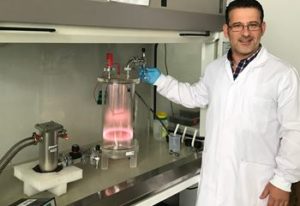Ten Flinders University research labs have been awarded more than $6.7 million in Australian Research Council Discovery Projects grants.
The latest Australian Government ARC grants led by Flinders University span a wide range of innovative areas of neuroscience, microbiology, biomechanical engineering and organic chemistry, through to zoology, soil sciences and historical studies relevant to the Asia-Pacific.
Deputy Vice-Chancellor (Research), Professor Ray Chan, says the ARC's Discovery grants will extend the important work of a number of research leaders at Flinders University.
"Congratulations to the 10 Flinders project leads whose basic and applied research - many in collaboration with other expert colleagues and universities - will expand vital knowledge on key issues across the health, medical, technology, commercial, social and cultural arenas," says Professor Chan.
"Australian Research Council grants are significant career milestones for Australian researchers, and these Discovery Projects will cement the achievements of Flinders experts in relevant areas of significance for the nation."

The latest Flinders University Discovery Projects grants were awarded to:
Professor Penny Edmonds, College of Humanities, Arts and Social Sciences (HASS), $882,000 (with Prof Deirdre Coleman, Prof Pia Wiegmink, Dr Margaret Mishra, Dr Oliver Lueb and Imelda Miller): 'Unfreedom, Voices, Redress: Plantation Cultures of the Western Pacific.'
This project aims to examine the hidden histories of the Western Pacific's Anglo and German plantations. Benefits include bringing the Pacific into conversation with global debates on unfreedom and slavery and advancing political change across Australia and the Western Pacific.
Professor Michelle Coote, College of Science and Engineering (CSE), $848,300 (and Prof Alexander Bissember): 'Unlocking latent reactivity in chemical synthesis via electrochemistry'
This research will enable safer and greener manufacturing of high-value molecules, such as pharmaceuticals, that are central to improvements in human health and the quality of life enjoyed by modern society.
Dr Yee Lian Chew, College of Medicine and Public Health (MPH), $819,000: 'What makes a memory? Identifying learning molecules in a simple brain'
This proposal aims to dissect the minimal chemical requirements for learning and memory formation in the compact, experimentally-accessible nematode brain. These findings are essential to understand more complex forms of learning and memory formation in bigger brains.
Professor Nick Spencer, MPH, $784,652 (and Prof John Rogers): 'Recording gut activity in freely moving animals using wireless technology' The project expects to generate crucial new knowledge about gut function in the body including which patterns of gut activity are controlled by the peripheral nervous system and how gut activity is modified during environmental changes. This research aims to place Australia at the forefront of gut research.

Professor Krasimir Vasilev, MPH, $722,523 (with Professor John Hayball, Dr Richard Bright and Associate Professor Kerrilyn Diener): 'Advanced Glucated End Products in Immune Responses to Biomaterials'
Outcomes of the project will create new fundamental knowledge that in the future can instruct the development of the next generation of biomaterials capable of controlling and directing the body's inflammatory responses.
Professor Karin Nordström, MPH, $686,295 (with Prof Thomas Nowotny and A/Professor Simon Sponberg): 'Closing the loop on target detection: Neural and behavioural mechanisms'
Major outcomes include advanced knowledge in sensorimotor processing, closed-loop control learnings with implications for robotics, novel technique development, and, as hoverflies are important pollinators, potential future gains for agriculture
Professor Robert Edwards, CSE, $685,781 (Dr Vijini Mallawaarachchi and Prof Dr Bas Dutilh): 'Discovering new ways to generate targeted mutations'
This study will combine genetic and genomic experiments with bioinformatics to identify new mechanisms that phages (viruses that infect bacteria) use to create targeted mutations. These enzymes can be used for biotechnology and genome engineering.

Professor Matthew Fitzpatrick, HASS, $618,568 (Associate Professor Tomoko Akami, Dr Prudence Flowers, Dr Kristie Flannery and Desmond Doulatram): 'Pacific Powers: Imperial Competition and Cooperation in Micronesia'
This project will assess why Micronesia has been the site of competing projects of power projection and how the people of the region have responded to radically different imperial powers - the Spanish, the Germans, the Japanese and the United States before winning independence. In doing so, it seeks to offer a deeper understanding of our region.
Associate Professor Martin Breed, CSE, $460,410 (Dr Jake Robinson, Prof Xin Sun, Dr Craig Liddicoat, Prof Timothy Cavagnaro and Dr Louise Roberts): 'Advancing soil health assessments with ecoacoustics'
Expected outcomes include an enhanced capacity to measure soil biodiversity which should provide significant benefits, such as enhancing ecosystem restoration monitoring and precision agriculture practices, contributing to reducing the economic costs associated with soil degradation.
Dr Alessandro Antonello, HASS, $254,018 : 'Our Blue Backyard: A History of Australian Cities and Marine Environments'
Through diverse archival and material sources, this project expects to reveal how urban communities and institutions in Adelaide, Brisbane and Melbourne have developed knowledge, policies, and practices around their dynamic 'blue backyards'. New systematic knowledge will benefit continuing policymaking and environmental management for sustainable and resilient coasts and oceans.






